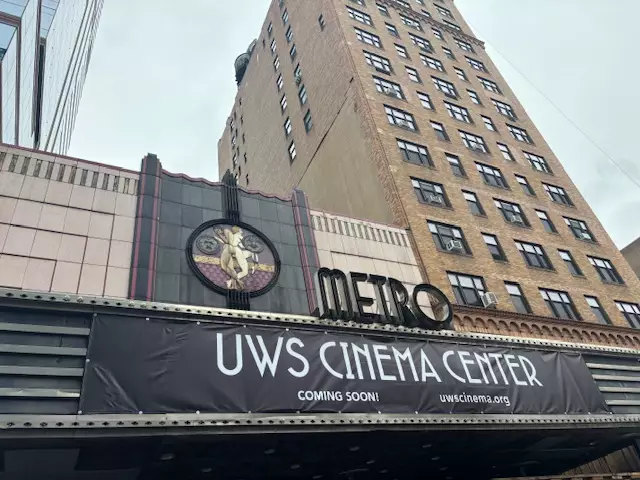In a momentous shift for New York City’s Upper West Side, the historic Metro theater is set to rise from the ashes of neglect and revitalization thanks to the hard work of passionate advocates. This transformation into a five-screen arthouse theater, funded through a combination of public and private grants, marks a significant departure from the current cultural landscape that has left the neighborhood devoid of cinematic experiences. Led by Ira Deutchman and co-founder Adeline Monzier, the newly established Upper West Side Cinema Center aims to restore a vital cultural hub that has been sorely missed since the closure of the Lincoln Plaza Cinema. It’s not just about turning the lights back on; it’s about reigniting a passion for the arts in a community that has felt bereft of creativity and connection.
The importance of this revival cannot be understated. The Metro theater, which has sat empty for nearly two decades, serves as a symbol of lost cultural vibrancy. As Deutchman aptly puts it, this empty space “stood as a silent reminder of what once was,” and now it represents the chance to reclaim a gathering place for the community. The initiative’s objective extends beyond merely screening films; it seeks to create a communal atmosphere—an arts venue where stories can be shared and where diverse perspectives can flourish. This reclamation fundamentally challenges the narrative that Upper Manhattan is a cultural wasteland, particularly as digital isolation continues to fracture community bonds.
Funding and Support: A Collective Effort
The financial backing for this massive undertaking is illustrative of the broader cultural investment that the community is rallying behind. With a total estimated project cost of between $15 million and $22 million, support from both state agencies and private donors is a testament to the community’s resolve. Governor Kathy Hochul’s allocation of $3.5 million, alongside contributions from notable foundations, showcases a collaborative commitment to revitalize a space that has long been sidelined. The urgency to restore the Metro theater before the January deadline emphasizes that cultural preservation cannot wait for a more convenient time; immediate action is necessary.
What is compelling here is the narrative of solidarity that has emerged. High-profile endorsements from famous figures in the film industry, like Martin Scorsese and Frances McDormand, reveal a multi-layered understanding of independent cinema’s role in American society. They recognize that it serves more than just entertainment; it fosters cultural dialogue and community cohesion. This collective effort sets an important precedent—the resurgence of the arts depends not only on financial contributions but also on the emotional investment of a community that is eager for a rich cultural experience.
Educational Opportunities: More than Just Movies
One of the unique features of the Upper West Side Cinema Center is its vision for an educational component to accompany its film screenings. The commitment to offering educational programming opens the door for community members to engage more deeply with film as an art form. Whether through film studies courses, workshops, or guest lectures from industry experts, the cinema will play a critical role in cultivating a more informed and passionate generation of film lovers. This aligns perfectly with the center’s mission of revitalizing community connection; education in the arts forms a bridge that connects individuals to a larger collective experience.
Moreover, this educational aspect is not just ancillary; it is integral to redefining what the theater experience can mean in the 21st century. Traditional cinema has often been passive, but by intertwining education with film exhibition, the Upper West Side Cinema Center aims to inspire active engagement. As audiences learn more about film history, cinematic techniques, and cultural contexts, the act of watching a film transforms from mere entertainment to a thoughtful experience.
Filling a Cultural Vacuum
As urban spaces evolve, the loss of community gathering points like the Metro theater has profound implications. The decline of independent theaters has stripped Upper Manhattan of a pivotal cultural touchstone, contributing to a growing sense of fragmentation. The Upper West Side Cinema Center’s emergence is a direct response to this cultural vacuum and reflects a larger societal appetite for both shared experiences and thoughtful artistry.
The movement to reopen this arthouse theater points toward a broader recognition of cinema not merely as an entertainment medium but as a communal lifeline that fosters social connection. It combat the prevailing trend of isolation that pervades modern life, especially following the COVID-19 pandemic, which has further alienated individuals from one another. By creating a dedicated space where local residents can engage with art, history, and one another, this initiative has the potential to foster a renewed sense of belonging.
In a world increasingly governed by technology and digital platforms, the reestablishment of a community-driven arts space challenges the narrative that cultural experiences must solely exist online. As the Upper West Side Cinema Center begins to take shape, we are reminded how essential it is to prioritize spaces that nourish not only our intellect but our social bonds. The revitalization of the Metro theater could become a vital chapter in a narrative that champions culture, creativity, and community connection.

